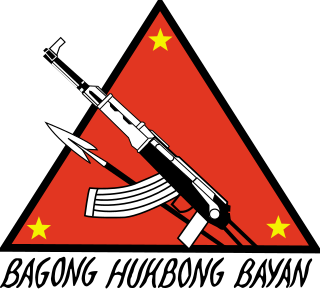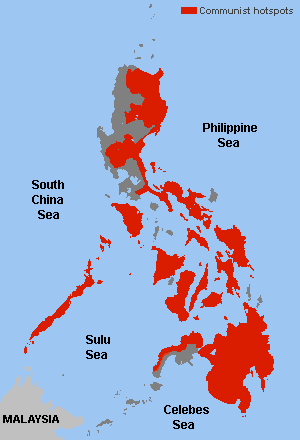
The Proletarian Party of America (PPA) was a small communist political party in the United States, originating in 1920 and terminated in 1971. Originally an offshoot of the Communist Party of America, the group maintained an independent existence for over five decades. It is best remembered for carrying forward Charles H. Kerr & Co., the oldest publisher of Marxist books in America.

The Communist Party of Pakistan is a communist party in Pakistan founded in 1948 by Sajjad Zaheer.
Revolutionary Workers Headquarters (RWH) was a U.S. Marxist-Leninist organization that formed out of a split from the Revolutionary Communist Party (RCP) in 1977. After Mao Zedong, leader of the Communist Party of China, died in 1976, the majority of the RCP's leadership criticized the post-Mao Chinese leadership as "revisionist" and "capitalist-roaders", saying that China was no longer a socialist country.

The New People's Army, abbreviated NPA or BHB, is the armed wing of the Communist Party of the Philippines (CPP). It acts as the CPP's principal organization, aiming to consolidate political power from what it sees as the present "bourgeois reactionary puppet government" and to aid in the "people's democratic revolution". Founded on March 29, 1969, by the collaboration of Jose Maria Sison and former members of the Hukbalahap led by Bernabe Buscayno, the NPA has since waged a guerrilla war based on the Maoist strategy of protracted people's war. The NPA is one of the key figures in the ongoing Communist rebellion in the Philippines, the longest ongoing conflict in the country.
The New Communist movement (NCM) was a diverse left-wing political movement during the 1970s and 1980s. The NCM were a movement of the New Left that represented a diverse grouping of Marxist–Leninists and Maoists inspired by Cuban, Chinese, and Vietnamese revolutions. This movement emphasized opposition to racism and sexism, solidarity with oppressed peoples of the third-world, and the establishment of socialism by popular revolution. The movement, according to historian and NCM activist Max Elbaum, had an estimated 10,000 cadre members at its peak influence.

The Communist Party of the Philippines (CPP) is a far-left, Marxist–Leninist–Maoist revolutionary organization and communist party in the Philippines, formed by Jose Maria Sison on 26 December 1968. It is designated as a terrorist group by the United States Department of State together with Sison and its armed wing New People's Army (NPA) in 2002. The European Union renewed its terrorist designation on the organization in 2019, though a 2009 ruling by the EU's second highest court delisted Sison as a "person supporting terrorism" and reversed a decision by member governments to freeze assets. According to the US' Central Intelligence Agency (CIA) World Factbook, the CPP and the NPA aims to destabilize the Philippines' economy and overthrow the national government.

Filemon Castelar Lagman, popularly known as Ka Popoy, was a revolutionary socialist and workers' leader in the Philippines. He shares the ideology of Marxism-Leninism. He split with the Communist Party of the Philippines in 1991 to form Bukluran ng Manggagawang Pilipino (BMP) and the multi-sectoral group Sanlakas.

The Workers' Communist Party is a communist party in Italy. It was created in 2006 by the Trotskyist breakaway wing of the Communist Refoundation Party led by Marco Ferrando. The PCL is the Italian section of Coordinating Committee for the Refoundation of the Fourth International.

The Partido Komunista ng Pilipinas-1930 (PKP-1930), also known as the Philippine Communist Party, is a communist party in the Philippines that was established on November 7, 1930. It uses the aforementioned appellation in order to distinguish itself from its better known splinter group, the Communist Party of the Philippines.

The Revolutionary Workers' Party of the Philippines is a communist party that split from the Communist Party of the Philippines during the Second Great Rectification Movement.

The New People's Army rebellion is an ongoing conflict between the government of the Philippines and the New People's Army (NPA), which is the armed wing of the Marxist–Leninist–Maoist Communist Party of the Philippines (CPP). It is the world's longest ongoing communist insurgency, and is the largest, most prominent communist armed conflict in the Philippines, seeing more than 43,000 insurgency-related fatalities between 1969 and 2008. Because the National Democratic Front of the Philippines (NDFP) which is the legal wing of the CPP, is often associated with the conflict, it is often also called the CPP-NPA-NDF conflict, or simply the C/N/N conflict, especially in the context of peace talks with the Philippine government.

The Japan Labour-Farmer Party was a socialist political party in Japan between December 1926 and December 1928. During its existence, it occupied a centrist position in the divided socialist movement.
Marxism–Leninism–Maoism (MLM) is a political philosophy that synthesizes and builds upon Marxism–Leninism and Maoism. Its proponents refer to Marxism–Leninism–Maoism as Maoism and Maoism as Mao Zedong Thought (MZT) or Marxism–Leninism–Mao Zedong Thought. Marxism–Leninism–Maoism was first formalized by the Shining Path in 1982 although Marxism–Leninism–Maoism was proclaimed as a central tenet of the North Kalimantan Communist Party in 1969.
The International Conference of Marxist–Leninist Parties and Organizations (ICMLPO) was an international grouping of political parties and organizations adhering to Mao Zedong Thought founded in 1998 by the Marxist-Leninist Party of Germany. It was organized by a Joint Coordination Group and met every two or three years. It ceased to exist in 2017.

The history of communist armed conflicts in the Philippines is closely related to the history of Communism in the Philippines, with various armed conflict linked to the armed wings of the various communist organizations that have evolved since 1930. The two largest conflicts have been the Hukbalahap Rebellion of 1942–1954, and the ongoing rebellion of the New People's Army, which began in 1969 under the auspices of the Communist Party of the Philippines (CPP). But various splinter groups have since separated from the CPP and have had a history of armed conflict with the Philippine government since then.
Communism in the Philippines emerged in the first half of the 20th century during the American Colonial Era of the Philippines. Communist movements originated in labor unions and peasant groups. The communist movement has had multiple periods of popularity and relevance to the national affairs of the country, most notably during the Second World War and the Martial Law Era of the Philippines. Currently the communist movement is underground and considered an insurgent movement by the Armed Forces of the Philippines.
The Revolutionary Proletarian Army, also known by the acronym RPA, was the military wing of the Revolutionary Workers' Party (RPM-P), a communist party that split from the Communist Party of the Philippines.
The Second Great Rectification Movement refers to a 1992 ideological campaign initiated by the leadership of the Communist Party of the Philippines (CPP) wherein an effort was made to "identify, repudiate and rectify the errors of urban insurrectionism, premature big formations of the New People's Army and anti-infiltration hysteria". The rectification movement resulted in the once monolithic Filipino communist party fragmenting into at least eight warring factions during the 1990s.

The Maximalist Italian Socialist Party or PSIm, was the residual part of the Italian Socialist Party in exile following the split that occurred during the first phases of the Socialist Convention of Grenoble, held on 16 March 1930, by Pietro Nenni and the fusionist fraction.
Communism has been a part of French politics since the early 20th century at the latest. It has been described as "an enduring presence on the French political scene" for most of the 20th century.











